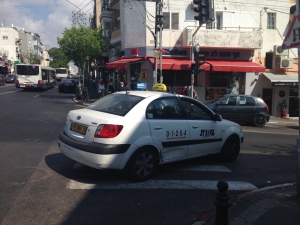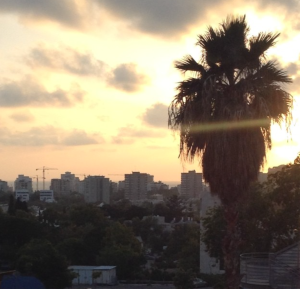Found, or Still Looking: Israel
Today, for the last time, I took the 25 to Melech George Street. Today, for the thousandth time, I referred to my destination as “the city center.” Today, for the first time, I realized that each time I used this phrase I’d gone to a different location.
If you visited the city that has been my home for the past two months, I could tell you where to find the Yemenite soup stand that only permits American tourists to order chicken soup, the bench in Hayarkon Park that provides the shadiest spot in the afternoon, and the old vendor who preys most mercilessly on those too shy to demand reasonable prices at the Shuk. But I could not tell you where, exactly, the center of the city lies.
This is due, in part, to what I consider a major error in Tel Aviv’s urban planning. The geographic center of the city—and its exact location is debatable, give or take Jaffa—probably lies somewhere around Dizzengoff Street. It seems that at some point, an attempt was made to mark this spot officially, with the creation of Dizengoff Square.
Dizengoff Square, in typical Israeli fashion, is, more like a lopsided hexagon. It could be a beautiful outdoor meeting spot—a raised platform surrounded by coffee shops and juice stands, decorated with a well-designed, if somewhat tacky, multicolored fountain. Benches surround said fountain, and paths lead off to the city’s major streets.
But the Square will never be a central meeting spot, for the simple reason that it has no shade. With its concrete base and short surrounding walls, Dizengoff Square looks like a giant Shakshuka pan, multi-colored egg and all, in the middle of the city. (Following this food metaphor, humans are tomatoes, growing red in the sun).
So Dizengoff is out. Rabin Square is too far North; the Shuk too far South. You and I are left aimless, asteroids fallen out of orbit in space.
Perhaps this has not bothered me until now because only now have I begun to worry about finding centers, locating the heart of things amidst winding streets and wandering thoughts.
I could not tell you what the heart of my experience here has been, no more than I could locate the center of Tel Aviv.
I have been thinking of something I learned in high school chemistry class, about the discovery of the atom. It turns out the atom had been written about since the time of the ancient Greeks, but only in 1911—after Einstein had already discovered smaller particles—did scientists figure out just what comprised it. A chemist named Rutherford, believing that the atom had both positive and negative particles, bombarded one with double-positive alpha particles, so that, by observing where the alpha particles violently bounced back or collided but then pushed through, one could determine the location of the atom’s oppositely charged particles.
But Rutherford did not foresee the results—most of the alpha particles simply passed through. From this, he theorized, and this theory, though expanded upon, largely holds, that the atom consists almost entirely of empty space. It holds a small, dense, positively charged nucleus in the center, around which tiny electrons orbit. But mostly—empty space.
I think that memories work like atoms; in a few months or years, this trip will carry a small, deep concentration of memory, but the majority of my activities will be forgotten, empty spaces in time. Yet I can’t say now what will be the nucleus, and what will be the empty space.
It seems wrong or lazy to identify anything as the nucleus but the war, the casualties, the sirens; the travails of tourism must be merely superficial asides. But if the way to counter death is by living, then my personal experiences should be my nucleus/ city center, the hatred and prejudice of the conflict dangerous distractions.
And so, I wander, aimless.
Lately I have received several Facebook messages from friends and family members asking, “How is Israel?” I’m not always sure how this question is intended—as a friendly inquiry about my travels, or an instigation to political debate, or a mere expression of confusion that I can physically exist in a place that seems so abstract. The “Israel” in this question might be a geographic nation or a symbolic entity; neither of us is quite sure which.
So I answer this question with a detailed, memorized response, one I have saved in a Word document for future use:
“Thanks for checking in!! (two exclamation points) Israel is great, I’m having so much fun here. Of course, it’s a little stressful right now, with everything that’s been going on, but I’m in a safe location so I know I’m not in any danger. My internship is fun, the people here are really nice, and the food is AMAZING (all caps). I go to the beach a lot. I even have a tan!”
What appeals to me about this response, besides the reassurance I can provide through exclamation points, is its list-like nature. Items, rattled off one by one, don’t have to be ordered or prioritized; the center can remain hidden. Word-count wise, the war gets hardly any more attention than the beach.
It is easy, indeed, to understand things as lists, as lines. I can see the timeline of my trip so clearly. I can see myself boarding El Al for Birthright, arriving suitcase-heavy a week and a half later at the home of relatives I had never before met, stepping on to the 13 to ride to work, stepping on to a thousand 13s, a thousand 25s and 24s. I can see these events forming a narrative, beginning to end.
I can see myself, too, walking outside after hearing the first sirens, confused as to why what I mistook for a routine ambulance had everyone huddled in a circle and our evening trip to the theater cancelled. I can see myself, about to go to October Bar, reading the news alert announcing the ground invasion of Gaza. I can see myself reading a thousand news alerts, walking into a dozen shelters, wishing an infinite number of times that it would end.
I can see where these two threads intersect, time-wise, but I can’t see which orbits the other.
When I think about history, I never think about the ordinary events that must have been occurring at the same time—some of which must have felt as significant as war and international politics for the individuals experiencing them. That is the way history books are written (or most non-revisionist history books, anyway), just the nucleus and no empty space.
Is it selfish to focus on the events of the periphery? Is it elitist or neglectful not to?
The issue, as always, becomes doubly complicated when Israel enters the picture. It seems naïve at best, insensitive, at worst, to enjoy food and art and nightlife when the world is falling apart at its seams. Does it substantiate the claims of disproportionality in this conflict to say that I still enjoyed Israel while Gazans my age were dying?
Then there’s the issue of Zionism. Which love for Israel—the love that engenders a desire for nationhood, or the simple love of a culture and place—constitutes the nucleus of my feelings about the country? More importantly, is it even possible to have one without the other? Yes, Zionism is a political ideology rooted in religion and history, but like all political ideologies, it’s deeply tied with emotion. Part of the national pride that has sustained Zionism is the pride in Israel’s culture, its beautiful people, its vibrant cities. And conversely, because it is impossible to live in or visit Israel without some encounter with the conflict (even during peacetime; debates always abound), an appreciation of its culture necessarily encompasses the political culture.
There was another theory about the atom, before Rutherford’s. It was my favorite in chemistry class because it sounds so silly—it’s called the “pudding model.” An earlier chemist, J.J. Thomson, hypothesized that the atom looked like a sticky lump, with negative particles stuck to a positive sphere; not necessarily a center—how can such an inextricable mess even have a center?
Thomson was wrong about the atom, of course, but maybe that’s a better model for Israel, the pudding model. Every particle bound together so tightly that nothing can be separated; there can’t be a center because no aspect of life here remains totally distinct.
I ran into bomb shelters in the middle of phenomenal meals at Tel Aviv restaurants; I checked news alerts on my phone between scenes at Cameri theater; I discussed (if not argued about) the conflict with almost every Israeli I met. The pudding, you could say, has been stirred too thoroughly.
And I don’t think I was so wrong when I called every one of my destinations “the city center.” For Allenby runs parallel to Dizengoff, which crosses Melech George, leading to Ibn Gbriol. If you wander aimlessly for a while, you’ll end up walking down each one, and maybe that’s not so aimless after all.
I’ll be home in less than 24 hours. I’m not completely sure, after all of this, how to answer the question: “How was Israel?”
But I’ll tell anyone who asks that should she ever find herself in Tel Aviv, she should take the 25 to the city center.

